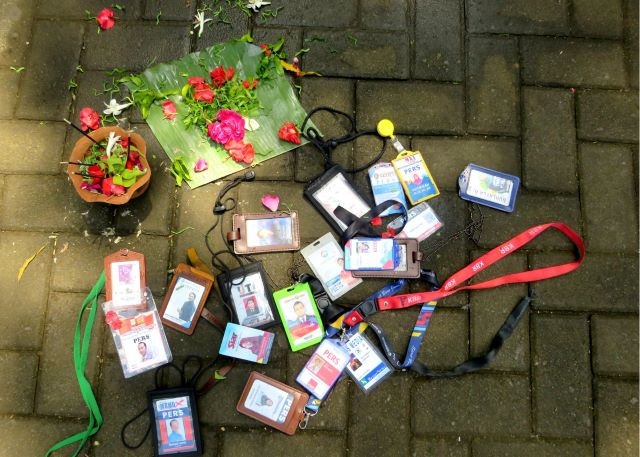Bali allots Rp 13b for anti-rabies vaccines
Anticipating an increase of rabies cases in Bali throughout 2011, the Bali Health Agency promised to allocate Rp 13 billion (US$1
Change Size

A
nticipating an increase of rabies cases in Bali throughout 2011, the Bali Health Agency promised to allocate Rp 13 billion (US$1.44 million) to procure anti-rabies vaccines for humans, an official said.
The budget would be provided from the provincial and regency administrations’ coffers, agency head Nyoman Sutarga said.
“The province will disburse Rp 7.5 billion and the regency administrations will provide the remaining Rp 5.4 billion to procure 36,000 vials of anti-rabies vaccines,” Suteja said at Sanglah Central Hospital.
The current stockpile of 70,000 vials are still sufficient until April this year, he said, adding “We will only use the Rp 13 billion after we run out of stocks.”
Despite the ongoing vaccination drive and efforts to stockpile anti-rabies vaccines, the infection still continues to claim more lives.
Since the outbreak began in late 2008, continuing through the end of 2010, 107 people have died of the infection, with the number of fatalities increasing dramatically every year.
Rabies claimed four lives in Bali in 2008, and another 28 in 2009. Last year, the number of victims soared to 75. The epidemic infected only a few villages in a regency in South Bali during its initial stages.
Presently, the epidemic has spread to hundreds of villages located in all the island’s eight regencies and one city.
Most victims failed to receive immediate and proper medical treatment after being bitten by infectious dogs, mainly due to difficult access from their remote villages to hospitals capable of providing the vaccine. The low level of public awareness on post-bite treatment has also led to many bite victims’ unwillingness to seek proper medical treatment.
Some hospitals in certain regencies reportedly have run out of vaccine stocks, but Suteja said the problem was due to the lack of coordination between the hospitals and designated rabies centers.
“It’s a problem of coordination. In fact, the stocks of vaccines in every regency hospitals are still safe,”
he said.
The Bali administration is set to allocate a total of Rp 48 billion to handle rabies cases, including procuring vaccines for dogs and culling street dogs. The central government and the provincial administration have campaigned that the resort island would be free from rabies by 2012.
To help cope with the rising number of cases, the local administration is working together with non-government organizations to vaccinate at least 70 percent of the island’s estimated 500,000 dogs.
Local Udayana University scientists have introduced the use of intradermal rabies vaccinations to more effectively combat the life-threatening disease. The vaccination is proven to be capable of giving a quicker and more protective antibody response as compared to the conventional intramuscular method.









